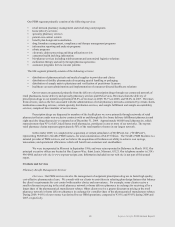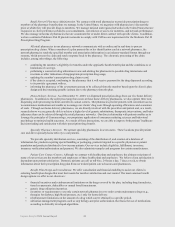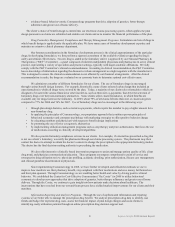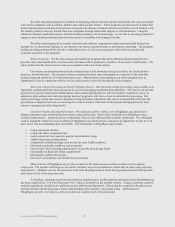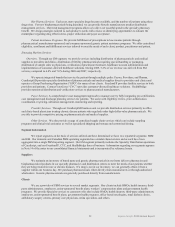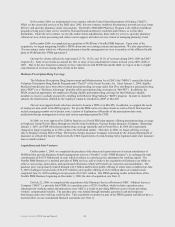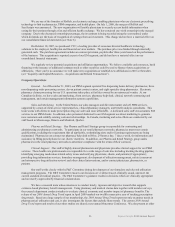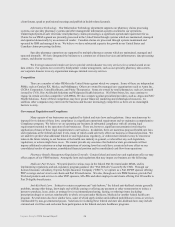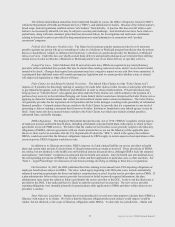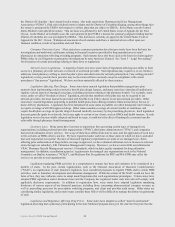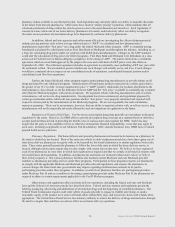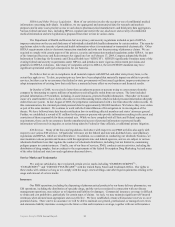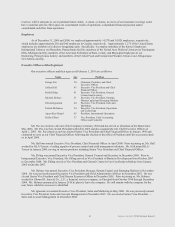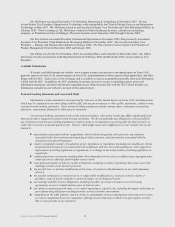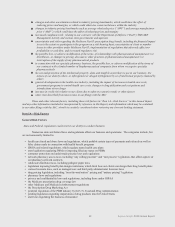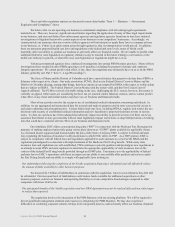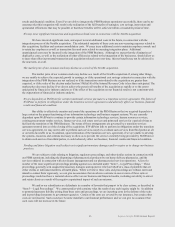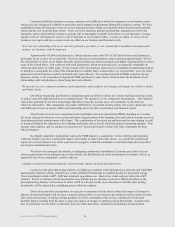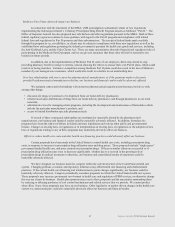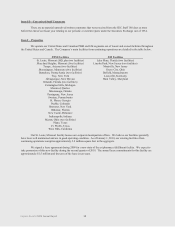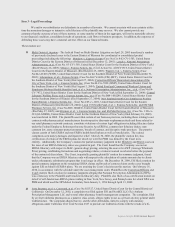Express Scripts 2009 Annual Report Download - page 31
Download and view the complete annual report
Please find page 31 of the 2009 Express Scripts annual report below. You can navigate through the pages in the report by either clicking on the pages listed below, or by using the keyword search tool below to find specific information within the annual report.
Express Scripts 2009 Annual Report
29
pharmacy makes available to any third party plan. Such legislation may adversely affect our ability to negotiate discounts
in the future from network pharmacies. Other states have enacted “unitary pricing” legislation, which mandates that all
wholesale purchasers of drugs within the state be given access to the same discounts and incentives. Such legislation, if
enacted in a state where one of our home delivery pharmacies is located, could adversely affect our ability to negotiate
discounts on our purchase of prescription drugs to be dispensed by our home delivery pharmacies.
In addition, federal and state agencies and enforcement officials are investigating the effects of pharmaceutical
industry pricing practices such as how average wholesale price (“AWP”) is calculated and how pharmaceutical
manufacturers report their “best price” on a drug under the federal Medicaid rebate program. AWP is a standard pricing
benchmark (calculated by a third-party such as First Data Bank or Medispan) used throughout the industry, including us, as
a basis for calculating drug prices under our contracts with health plans and pharmacies. Changes to the AWP standard
could alter the calculation of drug prices for federal programs. First Data Bank and Medispan were defendants in a class
action suit in Federal Court in Boston alleging a conspiracy in the setting of AWP. The parties entered into a settlement
agreement which received final approval by the judge in the case and a roll-back of AWP prices went into effect on
September 26, 2009. The settlement agreement includes an agreement to potentially cease publishing AWP two years after
the settlement is final. We are unable to predict whether any such changes will actually occur, and if so, if such changes
would have a material adverse impact on our consolidated results of operations, consolidated financial position and/or
consolidated cash flow from operations.
Further, the federal Medicaid rebate program requires participating drug manufacturers to provide rebates on all
drugs purchased by state Medicaid programs. Manufacturers of brand name products must provide a rebate equivalent to
the greater of (a) 15.1% of the “average manufacturer price” (“AMP”) paid by wholesalers for products distributed to the
retail pharmacy class of trade, or (b) the difference between AMP and the “best price” available to essentially any customer
other than the Medicaid program, with certain exceptions. We negotiate rebates with drug manufacturers and, in certain
circumstances, sell services to drug manufacturers. Investigations have been commenced, and regulations proposed by
certain governmental entities which call into question whether “best prices” were properly calculated and reported with
respect to rebates paid by the manufacturers to the Medicaid programs. We are not responsible for such calculations,
reports or payments. There can be no assurance, however, that our ability to negotiate rebates with, or sell services to, drug
manufacturers will not be materially adversely affected by such investigations or regulations in the future.
Regulation of Financial Risk Plans. Fee-for-service prescription drug plans generally are not subject to financial
regulation by the states. However, if a PBM offers to provide prescription drug coverage on a capitated basis or otherwise
accepts material financial risk in providing the benefit, laws in various states may regulate the PBM. Such laws may
require that the party at risk establish reserves or otherwise demonstrate financial responsibility. Laws that may apply in
such cases, including as applicable to our Medicare Part D subsidiary, ESIC, include insurance laws, HMO laws or limited
prepaid health service plan laws.
Pharmacy Regulation. Our home delivery and specialty pharmacies are licensed to do business as a pharmacy in
the state in which they are located. Most of the states into which we deliver pharmaceuticals have laws that require out-of-
state home delivery pharmacies to register with, or be licensed by, the board of pharmacy or similar regulatory body in the
state. These states generally permit the pharmacy to follow the laws of the state in which the home delivery service is
located, although certain states require that we also comply with certain laws in that state. We believe we have registered
each of our pharmacies in every state in which such registration is required and that we comply in all material respects with
all required laws and regulations. In addition, our pharmacists and nurses are licensed in those states where we believe
their activity requires it. Our various pharmacy facilities also maintain certain Medicare and state Medicaid provider
numbers as pharmacies providing services under these programs. Participation in these programs requires our pharmacies
to comply with the applicable Medicare and Medicaid provider rules and regulations, and exposes the pharmacies to
various changes the federal and state governments may impose regarding reimbursement amounts to be paid to
participating providers under these programs. In addition, several of our pharmacy facilities are participating providers
under Medicare Part D, and as a condition to becoming a participating provider under Medicare Part D, the pharmacies are
required to adhere to certain requirements applicable to the Part D Medicare program.
Other statutes and regulations affect our home delivery operations, including the federal and state anti-kickback
laws and the federal civil monetary penalty law described above. Federal and state statutes and regulations govern the
labeling, packaging, advertising and adulteration of prescription drugs and the dispensing of controlled substances. The
Federal Trade Commission requires mail order sellers of goods generally to engage in truthful advertising, to stock a
reasonable supply of the product to be sold, to fill mail orders within thirty days, and to provide clients with refunds when
appropriate. The United States Postal Service has statutory authority to restrict the delivery of drugs and medicines through
the mail to a degree that could have an adverse effect on our home delivery operations.


